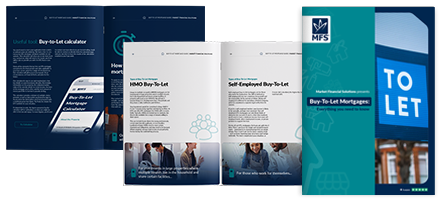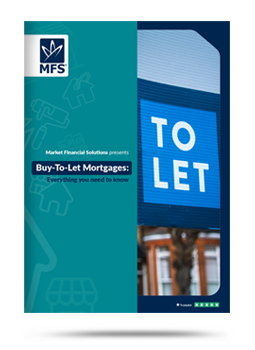Disclaimer
Market Financial Solutions are a bridging loan and buy-to-let mortgage provider, not financial advisors. Therefore, Investors are encouraged to seek professional advice. The information in this content is correct at time of writing.

Loan affordability is a serious issue in the property market. An issue which affects a range of debt-based products including personal loans, credit cards, and business loans. But of course, it’s mortgages and the investment market that sees some of the most dramatic fallout.
Mortgages are expensive at the moment[1]. For many, they’re becoming increasingly unaffordable. And for those who can still invest in the current market, the mortgages that are available to them will likely have very strict criteria.
In this blog, we’ll cover why loan affordability has become an issue, and what impact this is having on the wider property scene.
What’s happened to loan affordability?
Loans and mortgages became expensive primarily due to the recent base rate hikes we experienced. The Bank of England started raising the base rate from late 2021, and it eventually peaked at 5.25% in mid-2023[2]. Generally, when the base rate rises, retail banks and lenders tend to follow suit[3].
Eventually, the Bank of England started to cut the base rate in 2024, but many lenders still kept their rates high out of uncertainty[4]. Currently, there are millions of people in the UK on tracker or variable rate deals. The interest rates on these products tend to rise in line with the base rate.
Those on fixed-rate deals may be spared higher costs for now. But they’ll eventually need to remortgage or move onto another product at some point. In fact, the Bank of England estimates around 4.4 million mortgages are expected to see payments rise by 2027.[5]
Some borrowers who took on a mortgage at near-to-zero rates may soon be forced onto more expensive deals over the coming years. Around 1.8 million fixed rate mortgages are set to mature in 2025, according to UK Finance[6]. As the owners of these mortgages look for new options, they may see their repayments rise substantially.
Take, for example, a mortgage of £100,000 which sees an increase from 2% to 6%, assuming a 25-year capital and repayment plan. The monthly mortgage repayment would rise from £424 to £644. Assuming the same increase on a £300,000 mortgage, monthly repayments would rise by £661 – from £1,272 to £1,933.

What about inflation?
Our recent cost-of-living crisis didn’t help with affordability problems. Generally, mortgage lenders will have their own methods for assessing loan affordability. But, they will all engage with comparing a borrower’s income to a mortgage’s size via income multiples.
On average, high-street banks will provide a mortgage worth 4-4.5 times a salary[7], so long as all the other criteria is ticked. However, some will only offer as little as 3 times, while others will go as high as 6.
The wider problem with this is that house prices have skyrocketed over the years, yet income has not kept pace[8]. Wages are stagnant. While a lack of supply and other factors pushed demand for property.
To illustrate: total weekly pay in Great Britain rose by around 107% between January 2000 and February 2023[9]. But, during the same period, average property prices rose by nearly 240%[10]. This mismatch will be even more pronounced in places where property prices are particularly high – such as London.
With the costs of food, clothing, transport and more jumping recently, many would-be buyers are likely struggling to afford the basics. Let alone worry about loan affordability or mortgages.
How does this all affect the property market?
Put simply, where loan affordability levels plummet, it hinders demand. If borrowers are worried about how they’ll afford a mortgage, credit card, or personal loan, they may be less likely to apply in the first place.
Indeed, 94%[11] brokers surveyed in 2023 said mortgage affordability was especially complex to manage over the prior year or so. Some 89% also said they had to work harder to secure the loan sizes their clients wanted.
The challenge of securing appropriately sized loans will be a nationwide issue too. Over the last 25 years or so, housing affordability worsened in every Local Authority in England and Wales[12]. What’s more, mortgage lending plummeted to a 30-month low in 2024[13], given the higher costs facing borrowers, and stubbornly high house prices.
But, just because we’re collectively struggling against loan affordability, it doesn’t mean participants haven’t tried to find solutions. Brokers have also reported a rise in 30–40-year mortgages from lenders as buyers try to mitigate higher rates[14].
What’s the solution to loan affordability issues?
For property investors facing loan affordability issues, specialist finance may be able to offer reprieve. When we assess a claim, we look at the claimants’ wider circumstances. Rather than solely focus on their income.
Often, bridging finance is secured against property itself. Meaning a borrower’s income in relation to the property’s value may not hinder their eligibility. We focus primarily on the exit strategy, and the long-term prospects of the investment.
What’s more, specialist finance offers a more flexible option for property investors. As loan affordability became a problem for many, high street lenders tightened their criteria. The future looks uncertain, which makes banks nervous.
But, we have never stopped lending since our founding. We’re able to support investors in good times and bad. Even to those who may have missed payments, CCJs, or even bankruptcies on their records.
Also, we’re able to work with complicated setups that may not get very far in the mainstream market. We’re happy to hear from foreign nationals, corporate borrowers, and self-employed buyers.
If borrowers or brokers are worried about loan affordability, or any other property investment issues, we may be able to help.
The Complete Guide to
Buy-to-Let Mortgages
Everything you need to know
- Fundamentals
- Different mortgage types
- Useful tools
- Industry stats & more
[1] https://www.financialreporter.co.uk/mortgage-costs-still-more-than-40-of-borrower-income.html
[2] https://www.bankofengland.co.uk/monetary-policy/the-interest-rate-bank-rate
[3] https://www.forbes.com/uk/advisor/mortgages/bank-rate-explained/#why_is_the_bank_rate_important
[4] https://www.bbc.co.uk/news/articles/cr7nje57jrlo
[5] https://www.bbc.co.uk/news/articles/cn8g3n9y5x0o
[6] https://www.financialreporter.co.uk/blogs/will-2025-be-the-year-of-the-remortgage.html
[7] https://www.onlinemortgageadvisor.co.uk/mortgage-affordability/mortgage-affordability-checks/#how-do-mortgage-lenders-work-out-affordability
[8] https://www.buyassociationgroup.com/en-gb/news/uk-house-prices-50-years/
[9] https://www.ons.gov.uk/employmentandlabourmarket/peopleinwork/employmentandemployeetypes/bulletins/averageweeklyearningsingreatbritain/april2023
[10] https://landregistry.data.gov.uk/app/ukhpi/browse?from=2000-01-01&location=http%3A%2F%2Flandregistry.data.gov.uk%2Fid%2Fregion%2Funited-kingdom&to=2023-02-01&lang=en
[11] https://www.financialreporter.co.uk/94-of-brokers-say-affordability-is-more-complex-than-a-year-ago.html
[12] https://www.ons.gov.uk/peoplepopulationandcommunity/housing/bulletins/housingaffordabilityinenglandandwales/2022
[13] https://www.introducertoday.co.uk/breaking-news/2024/06/mortgage-lending-plummets-to-30-month-low-but-better-to-come/
[14] https://www.financialreporter.co.uk/longer-mortgage-terms-becoming-commonplace-brokers-say.html





